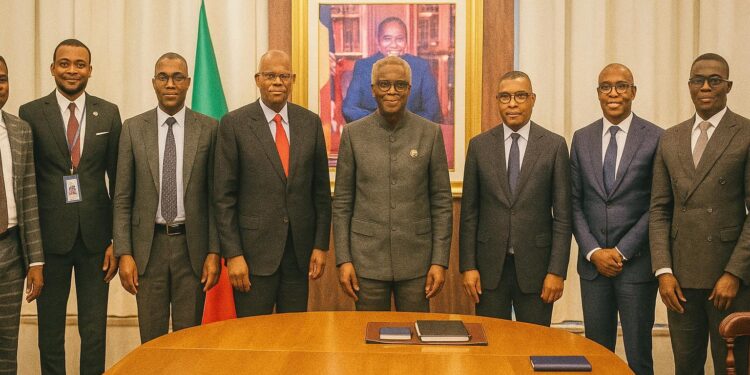A Forum and a Strategic Moment for Congo
The designation of Brazzaville as the venue for the seventh International Forum of Francophone Enterprises (FIEF) carries a symbolism that transcends the ceremonial. For the Republic of Congo, a member deeply involved in the Organisation Internationale de la Francophonie, the forum is an opportunity to demonstrate its growing capacity to convene high-level economic actors across the French-speaking world. The decision, taken at the Abidjan edition in May 2025, reflects the confidence of the Groupement du Patronat Francophone in Congo’s logistical readiness and political commitment.
Minister of the Economy Ludovic Ngatsé framed the event as a strategic inflection point. In his words, it will “reinforce the image of our country as a Central African business hub and consolidate our active role within Francophone economic networks”, a statement consistent with recent policy papers on regional integration (Congo Ministry of Economy, 2025).
Jean-Daniel Ovaga’s Diplomatic Mandate
The stewardship of Dr Jean-Daniel Ovaga, president of the National Union of Congolese Economic Operators and proprietor of the high-tech Securex Medical Clinic, adds technical gravitas to the organisational effort. His intervention in Abidjan, described by several delegates as a “measured yet compelling pitch” (Jeune Afrique, 2025), convinced the Francophone business community that Brazzaville could serve as a credible epicentre in 2026.
Ovaga’s immediate agenda is twofold. Domestically, he is engaging ministries responsible for SMEs, industrial development and public-private partnerships to craft an inter-ministerial roadmap that will survive electoral and budgetary cycles. Internationally, he is negotiating with prospective sponsors from Canada, Morocco and France to secure blended financing that offsets public expenditure while showcasing Congo’s receptiveness to foreign direct investment.
Infrastructure, Connectivity and Risk Management
Hosting up to a thousand delegates, including heads of state and Fortune 500 executives, requires more than ceremonial enthusiasm. Brazzaville’s Maya-Maya Airport is undergoing a targeted expansion of its VIP lounge and customs corridors, funded partly through a concessional loan from an African multilateral bank finalised in March 2025. Hoteliers report occupancy projections upwards of eighty per cent for the period, prompting negotiations for temporary modular accommodation along the Congo River embankment.
Security planners are equally active. Drawing on best practices from the 2022 Commonwealth Heads of Government Meeting in Kigali, Congolese authorities are introducing an integrated accreditation platform to streamline entry procedures for dignitaries while mitigating cyber-security risks identified in a recent UN Economic Commission for Africa brief (UNECA, 2024).
Francophone Synergies and Continental Ambitions
The broader diplomatic calculus lies in positioning Congo as a bridge between West- and Central-African growth poles. With the African Continental Free Trade Area entering its guided trade phase, Brazzaville’s forum aspires to facilitate cross-border joint ventures, particularly in agritech, transport corridors and digital finance. Analysts at the Dakar-based Initiative Prospective Agricole et Rurale note that Central Africa’s food imports could be reduced by fifteen per cent if logistical barriers are addressed through such partnerships (IPAR, 2025).
Moreover, the forum’s emphasis on French as a working language subtly reinforces cultural cohesion while accommodating multilingual panels. This balancing act aligns with the OIF’s 2023 strategy paper, which calls for “linguistic diversity anchored in economic pragmatism,” a line frequently echoed by Ovaga during preparatory briefings.
Sustainable Growth and Social Expectations
Local civil-society observers underline that reputational gains must translate into tangible benefits for Congolese entrepreneurs. The government’s commitment to reserve at least thirty per cent of exhibition space for domestic SMEs is therefore significant, offering them direct exposure to multinational procurement channels. A micro-credit facility, currently under discussion with a consortium of regional banks, could provide follow-on financing once memoranda signed at the forum mature into contracts.
Environmental stewardship also features on the agenda. Congo’s vast rainforest endows it with a substantial carbon sink, and officials intend to showcase investment vehicles that monetise conservation efforts without compromising sovereignty, an approach recently applauded in an African Development Bank policy note on climate finance (AfDB, 2025).
Harnessing Momentum Beyond 2026
As past hosts have discovered, the legacy of such summits depends on post-event institutional follow-up. Ovaga plans to establish a permanent francophone business observatory in Brazzaville, serving as both think tank and facilitation desk. Early discussions with the World Francophone Business Confederation suggest that the observatory could produce annual competitiveness rankings and coordinate visiting investor missions, thereby embedding Congo within a continuous knowledge circuit.
Ultimately, Congo’s aspiration is not merely to stage a successful event but to leverage FIEF 2026 as a catalyst for diversified growth. If tangible investment pipelines emerge—particularly in renewable energy and logistics—the forum may well be remembered as the moment Congo’s economic diplomacy graduated from promise to practice.












































